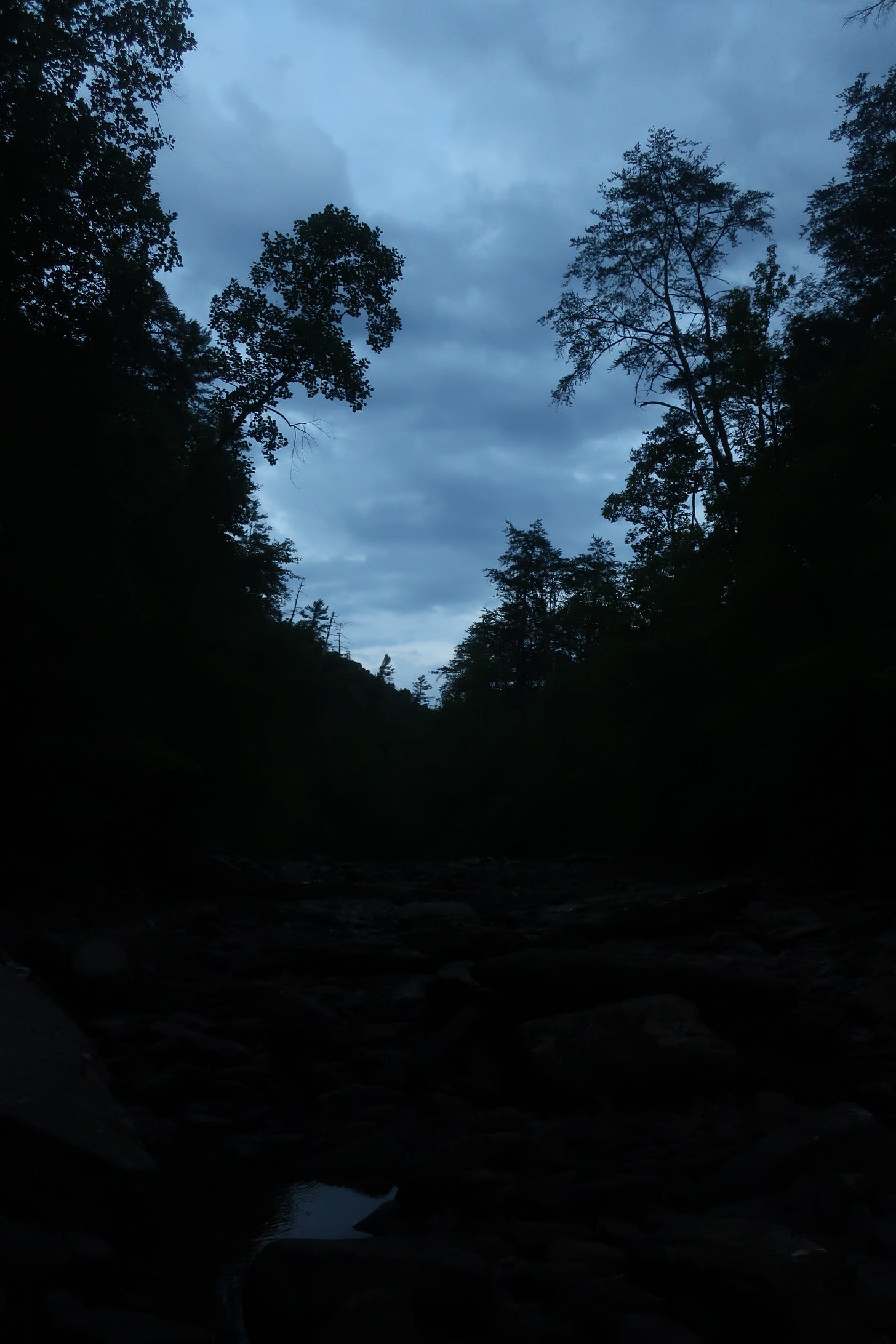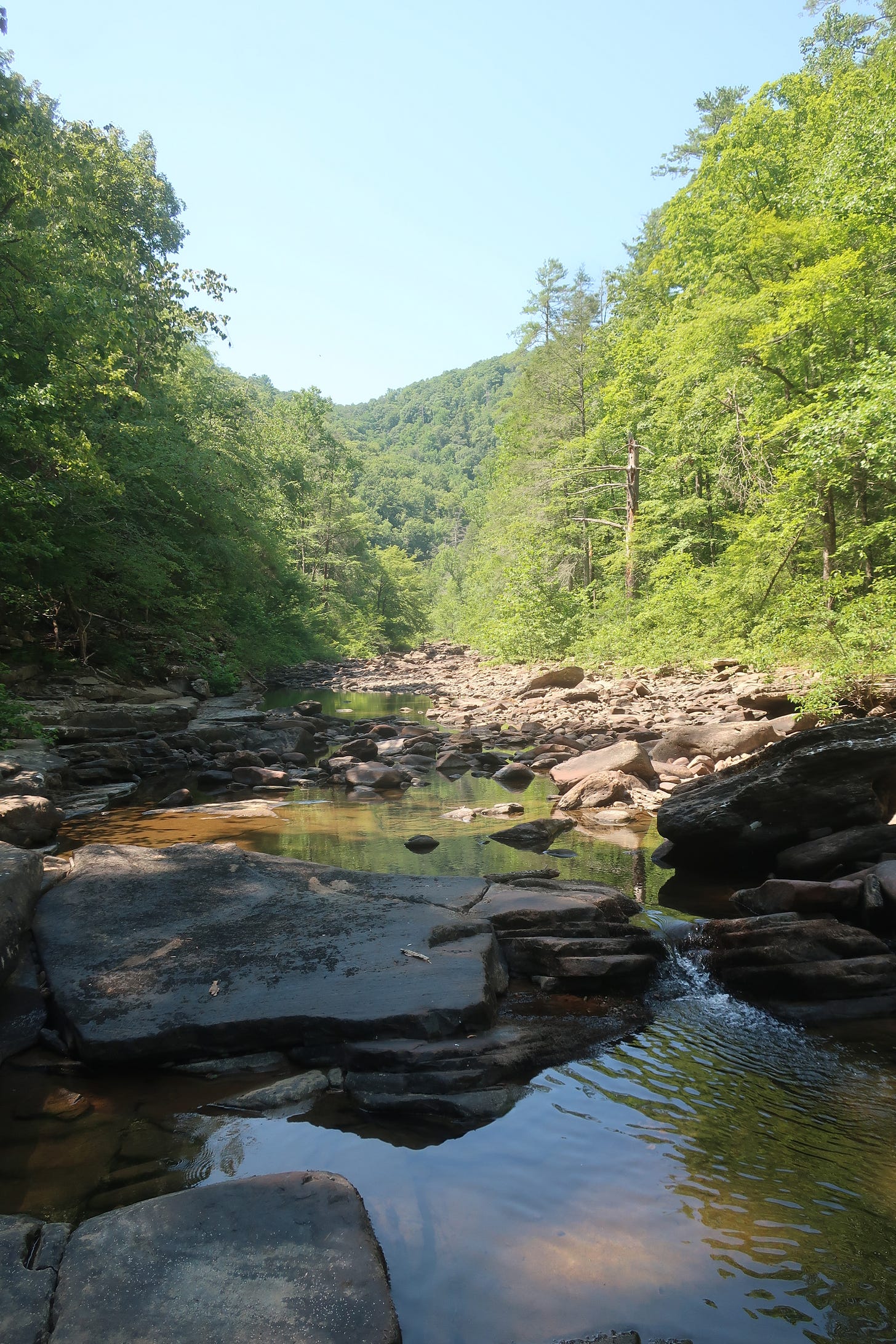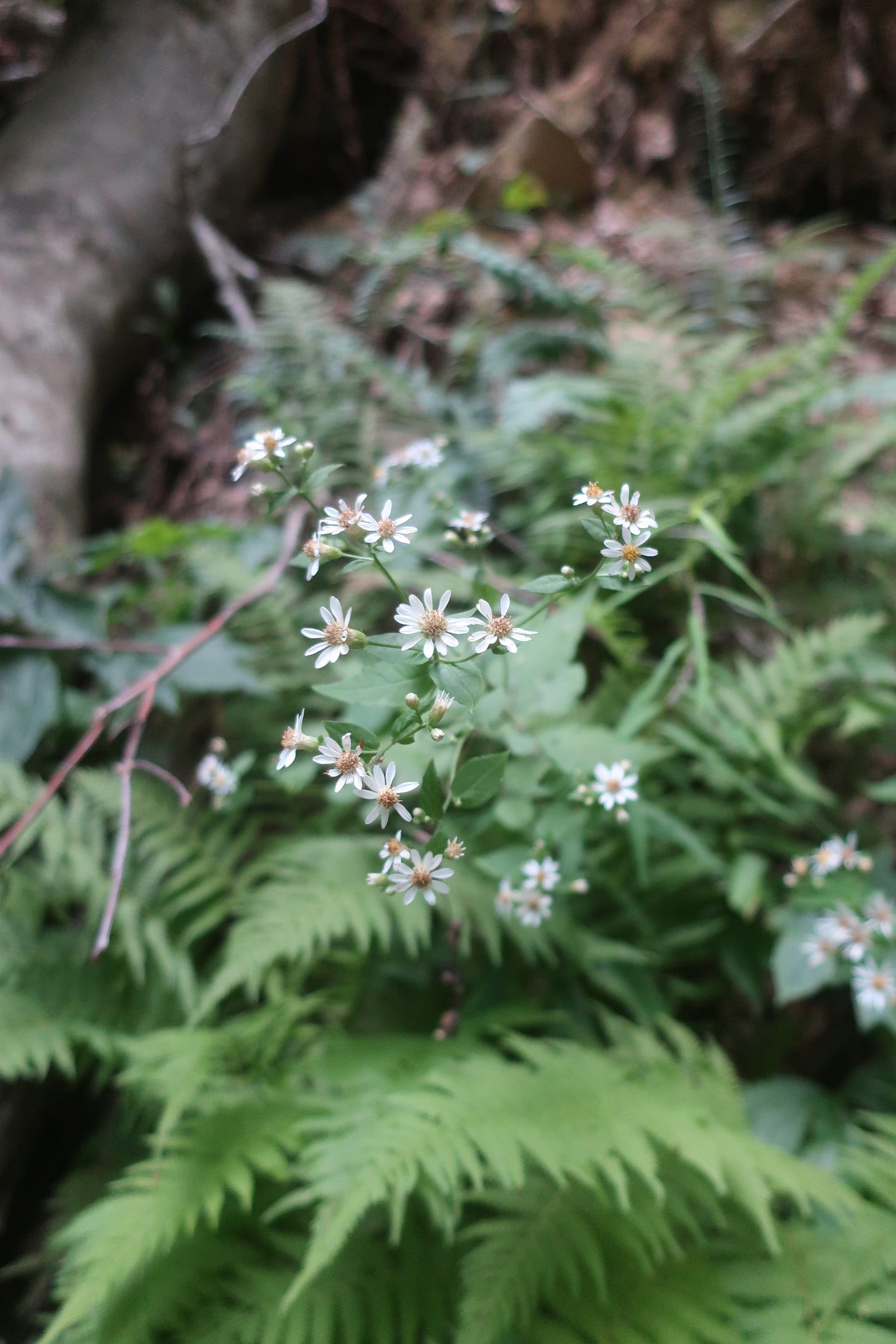The late summer stillness is not so much quiet as it is just heavy and dense, as I work my way up the gorge of the Piney River, alone on the trail, a deserted parking lot at the trailhead, more reasonable people staying off the trails. Once I round the first bend and the odd truck running up or down Shut In Gap Road is lost behind me, now the only sounds of the industrial machine left are the odd airplane high overhead, dim but present, an intrusion but just barely. It’s so hot, my backpack sticks to me and there is not a surface of my clothing not suffused with sweat. Makes it all the nicer when I stop over a little stream hidden under a great cascade of boulders, the deep spaces beneath fairly oozing cool air, wafting up against me. I’ve heard this sort of thing called natural air conditioning but like any such analogy it’s not good enough. I keep walking, it’s a pretty easy go if you don’t mind the heat and as long as I’m in the shade I don’t. Still I am glad to reach my campsite and go down to the water for a soak—the river is too low for a real swim, but that’s alright.
As I sink into the still chill waters of a much diminished little river, hidden down in the small pools and rivulets of the great wash of sandstone boulders and outcrops, I think about the people up there. It’s strange, I’m down here, not a another soul for miles, my clothes laid out on the rock, sitting up to my waist in the river water, the fish nibbling at my legs and the silt rising and falling in front of me, around me the pitch pine on the sand and bouldered river bar and the white pine and the rhododendron on the slope opposite are still, utterly still, and the insects are starting to call as the sun declines. I push off a little into deeper water and find the cold welling up from a deep spot under a big boulder. The people up there, who were up there a minute ago and are now hurtling off to who knows where—what are they doing? Do they know what they’re missing, in that sterile metal container rushing through the air? It’s sad, really.
I’ve been coming to this little river almost my entire life now, off and on—when I was a boy we lived not too far from its mouth, just a drive down through Grassy Cove and down off the Plateau to near the spot the Piney clears the mountain and slows to a crawl approaching the Tennessee. We never went upstream though, just swam and splashed and built rock dams in the pools and little cascades down by the little roadside park, but that was enough. I’m pretty sure my back muscles remember the strong but not too strong flow of the river as it pushed down off the mountain towards the sea and I’d drop my whole body into the force, the water rushing in every direction around and over me. I’m not sure what to call it—an infusion of energy, maybe, but going down to the water of our mountain streams, it’s something special, it does something to you. A couple weeks ago we brought the kids out to the Piney, and they loved it too. Not sure how you couldn’t, honestly.
This is my first time on the trail that runs up the river, though I’d wanted to hike it when I was a kid, it was just a little too far then for my then shorter legs, and in the years since for whatever reason I’d not gotten around to it, thought about it a few times. Now, thirty plus years later, I’m deep in the Piney’s gorge, the sky is getting dimmer, the air cooling just a little.
The deep places of the Cumberland Plateau are in my estimation among the most wonderful places on earth, though I am aware that I am not an objective observer. I love the whole swathe of the Southern Appalachians and have spent many happy nights in many watersheds and valleys and on many ridges and summits in the main range of the mountains, I feel very much at home there too. But these gorges and little mountains have their own unique charm and depth of being and feeling to them. It certainly helps that while the eastern hemlock has been devastated east of the Tennessee Valley, the woolly adelgid that’s killing it has only lately taken up in the Cumberlands, and is not so evident. Many of the now quite old—second growth seems a misnomer for some of these trees—hemlocks I pass at least look healthy, and I prefer to think that they are. These are trees as redolent of memory, of my boyhood, as the force of the river. It is hard to express what they mean to me, how these hemlock lined hollows and gorges speak to me. When I pause and look around in these forests I find myself surrounded by—and I know this sounds weird—friends, from the great bole of the hemlock on down, I know all of these plants, not just in the sense that I know their names and an assortment of facts about them, but a real familiarity, a comfort in being within these assemblages. That’s true here, and in the coastal plain forests of Mississippi, but not really anywhere else.
Once it’s good in dark and I’ve had dinner, pitched camp (sleeping in a hammock tonight), I settled against a stone chair someone’s built out here and read a slender volume of writings by the French personalist philosopher Gabriel Marcel, but I get distracted from time to time as one after another exquisite little moths land on the page, drawn to the light of my flashlight. Later as I say evening prayers a black and white narrow winged moth floats down onto the prayer book, just superb beauty, a flicker of Divine creativity and grace. The fireflies flash and float as I read, drifting higher into the trees by the time I make for bed. Another airplane moves far overhead, a dull dim roar. I wonder what they’re watching up there? The insects of the night are growing louder and louder, they overpower the faint trickle of the river’s drawn down flow, a beating reverberating heart of sound filling the gorge and rising up towards the mountain’s crest beyond. Every layer of the forested gorge is simply pulsing with life, the crescendo of high summer. I fall asleep wrapped in it.
At some point in the night I wake up, the insect army choirs have mostly gone quiet, and now the barred owls and the whippoorwills alternate, along with another night bird I don’t recognize, which is always a thrill. I stay awake long enough to listen. Unlike the crickets and katydids and all the rest of the high summer night insects, which flow and rise and fall into one another, a vast ocean of song, the owls and the whippoorwills are sharp and bright and entirely themselves, one owl calling to the other, the whippoorwills just calling, as if summoning something or someone. I always feel as if I am listening in to the voices from another world, from another sort of consciousness, when these birds call in the deeps of the night, an eavesdropper, only momentarily awake. I shiver a little, and fall back asleep.
Just as the sky is lightening I wake a second time, the world has gone quiet again, but for the first rounds of bird song, still and soft, growing as the light grows over the world.
In the full morning I rise late—the sun is slow to crest over the top of the gorge—and settle down on a boulder at the lip of the riverbed to make my breakfast. As the water for my oatmeal and tea boils I happen to look up and just across from me a coyote, sleek and trim in the colors of the stone, trots past, climbs a boulder and sniffs the air then heads up the bank. Behind, two more coyotes follow, but they see or smell me, turn, their tails in the air, and circle off in another direction, silent and fast. There is a presence between us, a momentary flicker. No sound, only a sense of things, without words. Later, I load up and push out, back down the gorge, stopping to scramble down a little bluff and drop to the river for one more soak, as the sun rises high in the sky. In the cool water the fish are everywhere, concentrated in the dwindling pools, and chromatic damselflies skim the water, half of them locked in their coital calligrams, looking for good places to lay eggs. I want to stay longer down here, sunk into the landscape, but I’m getting hungry and didn’t pack a proper lunch for myself, so I hike on out.
Later on the same day, a gunman will attempt to shoot a former president, grazing his ear, and killing a man in the crowd. At my home the insects will be loud, too, at night, but as with every night their song is broken up by the periodic growl of cars and trucks on the county road nearby, jarring and hostile. The bullets ring out, blood runs, our screens light up hot and heavy and loud.
There’s a reason I think that so many writers of wilderness come back into civilization and take a pretty dim view of other humans, of themselves even. There is an ugliness, a starkness, an abrasiveness, that has always been a part of us—read the Old Testament if you doubt it—but which has been channeled into our things, our things in turn taking up almost a life of their own, drowning us out and threatening to consume us in the grating noise, and it stands out in highest relief when you’ve been out of it for a bit. It doesn’t have to be this way, of course, at least not in the way that we’ve made it; when I go into the woods I carry with me the traces, material and immaterial, of the same modernity that wells up in ugliness and abrasion outside, manifest in different ways here and elsewhere, some neutral, some good, some that could go either way. There are other possibilities, other paths, some of them have been taken many, many times before, others are yet to be discovered.
At the very hour the bullets are ringing out, a church we’re in the midst of a service of the sacrament of holy unction, following on great vespers, praying over a member of our community battling cancer. Like the depths of the river gorge, like the high summer nocturne, there is a different spirit here, a peace, a presence, a low gentle roar in the sung words and the wash of the prayers, the soft drip and drop of the blessed oil. A wholeness and the offering of healing, open, flowing, living. Other ways, other paths, waiting, present, alive. Will we follow?






